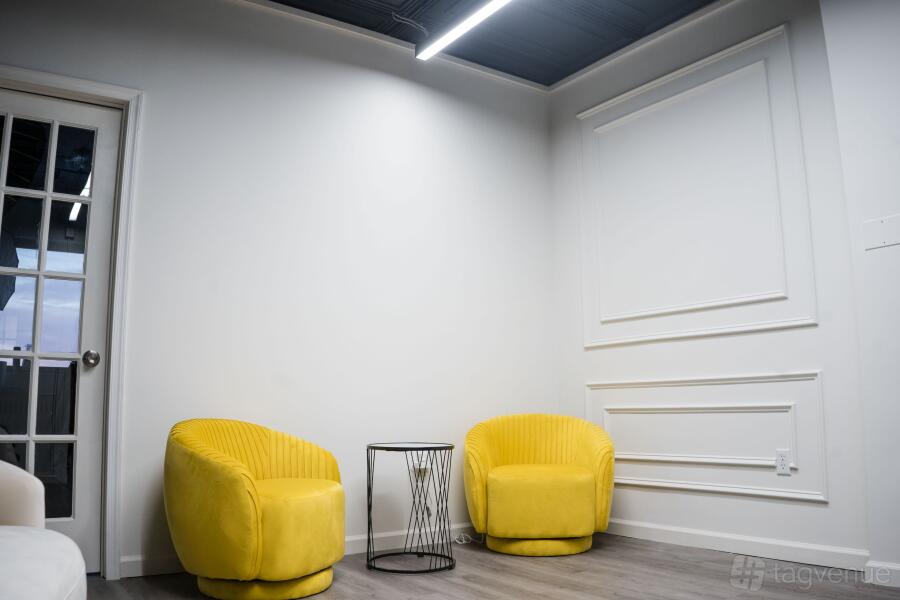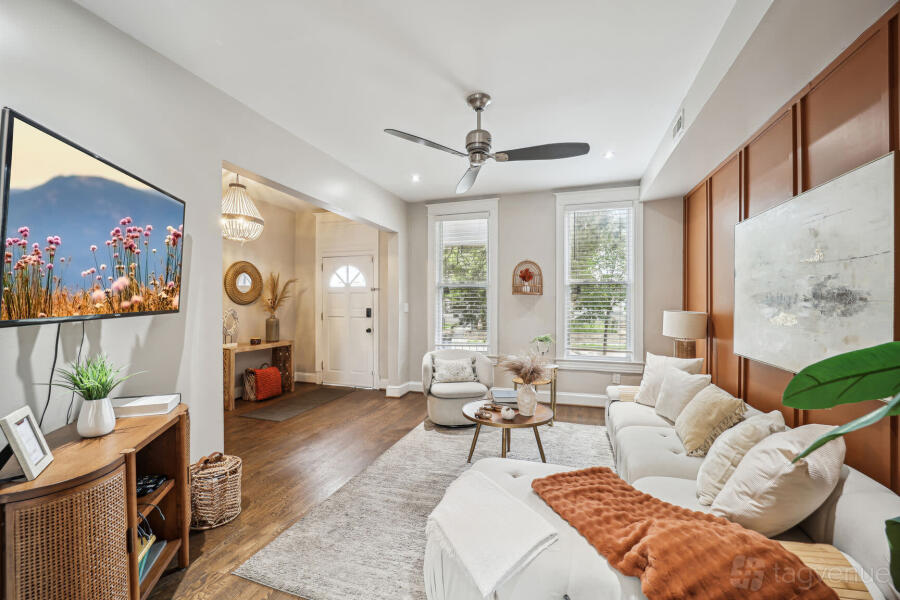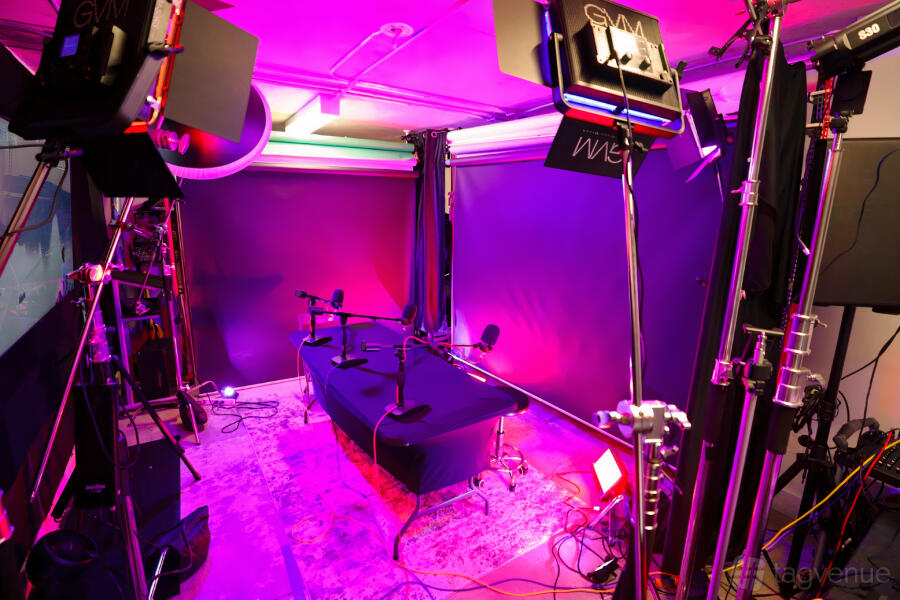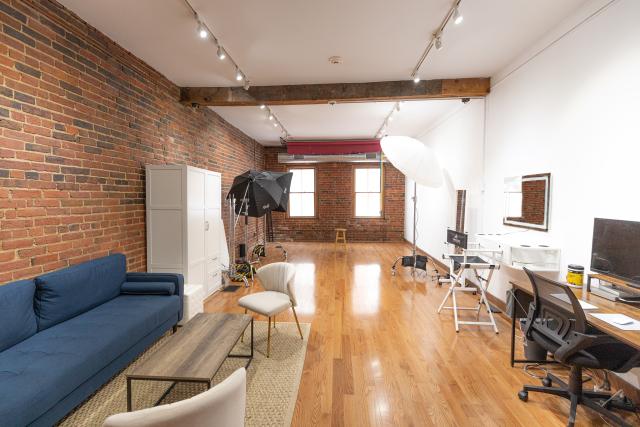Top Photo Studios in Washington, DC
Have you been looking around for photo studios in Washington, D.C.? Maybe Google search has given you some answers, but not the ones you’re looking for. Well, you’ve come to the perfect spot, because Tagvenue will blow all your photo-studio-searching troubles away. Are you looking for a clean, white studio space? Perhaps a decorated, photogenic venue or a simple green screen? Whatever it is that you desire, we’re here to help you book the perfect location. With hundreds of venues to choose from, you’re bound not to walk out empty-handed. Get scrolling, because the best photo studios in Washington D.C. are only a click away!
-
Studio A
15 guestsUnion 206Near Washington, DCStudio A is a spacious 1,330 sq ft rental studio featuring a large white curved Cyclorama wall, ideal for a variety of photography and video production needs.from $110
hire fee / per hour -
Blackout Studio
20 guestsThe Leadership InstituteNear Washington, DCThis 638 ft² space is a soundproof area designed for photoshoots and filming. During the hire, up to 20 guests are welcome to use the onsite podium, multiple backdrops, aperture lights, whiteboards, tables, chairs, and TVfrom $100
hire fee / per hour -
Modern Natural Light Studio
20 guestsLED StudiosNear Washington, DCA spacious, modern studio in Old Town Alexandria for photographers and videographers. Steps from the waterfront, there is high-speed Wi-Fi, restrooms, a dressing room, and a makeup area.from $70
hire fee / per hour -
Studio
15 guestsNova Production StudioNear Washington, DCThis venue is designed for production needs. It will fit purposes such as photography, filmmaking, or even virtual classes.from $43
hire fee / per hour -
Studio
7 guestsStudio4Near Washington, DCIt features 500 sqft of space available for your use. It is fit for multiple creative purposes - filming, photoshoots, podcast recording, or private events.from $85
hire fee / per hour -
Studio C
15 guestsUnion 206Near Washington, DCUnion 206 Studio offers photographers, videographers, and production companies a professional, all-inclusive venue. We can accommodate shoots ranging from simple headshots to complex, multi-day productions.from $110
hire fee / per hour -
Entire Studio
15 guestsTorch StudioNear Washington, DCTorch Studio is an open studio for photo shoots, videos, and even more. It has a totally white setting and receives much natural light; thus, it's very adaptable to the needs of your shoot.from $95
hire fee / per hour -
Studio B
10 guestsUnion 206Near Washington, DCStudio B is a spacious 760 sq ft rental studio with a variety of shooting areas and lifestyle groupings. Create additional sets with our selection of furniture and accessories included in your rental rate.from $110
hire fee / per hour -
Entire Venue
20 guestsBohemian Content Creation HouseNortheast, Washington, DCIt provides bright, well-staged rooms perfect for photoshoots, video shoots, and recording podcasts.from $85
hire fee / per hour -
Media Studio
7 guestsCreative Saint's LoftNear Washington, DCWith its inviting atmosphere, it's ideal for photoshoots, interviews, fashion shoots, and video productions.from $75
hire fee / per hour -
Entire Space
68 guestsStreetz MediaNortheast, Washington, DCWe specialize in creative visual production and photography. Our experts can help you transform your brand through dynamic video production, animation, and still photography.from $175
hire fee / per hour -
Stage 4
200 guestsStudio TheatreLogan Circle, Washington, DCStage 4 is the latest theatre to join Studio's complex at 14th and P Streets. A black box theatre, Stage 4 is an incredibly flexible space, offering designers and event hosts great latitude for creativity and the ultimatefrom $9775
hire fee / per day
- 1
- 2
- 3
- 4

FAQs about Top Photo Studios in Washington, DC
The rental fee for the photo studios starts at around $40 and ends at roughly $250 per hour. The price depends on a number of factors, such as the studio's location, the equipment inside, and additional facilities. These can include additional rooms in the studio, parking, wheelchair access, etc. (All data from Tagvenue.)
Typical photo studios will not have a very big capacity. You can expect enough space for up to 30 people standing in the bigger venue spaces. It is recommended that you don’t bring a lot of people to the photo studio, as they will cause a disturbance during your shoot. Opt for a max of 10 people, which includes the models, photographers, lighting directors and any managers you should have during the shoot. Avoid bringing friends or family members, and don’t forget that the more people you bring, the more likely it is that something could be damaged during the shoot.
Absolutely yes! As we mentioned before, you never know when something can go wrong. A lamp can be broken, a circuit burnt or a prop can go missing. You won’t see the end of paying off debt if you’re not careful enough. So get yourself properly insured. Remember, even if you feel that you won’t cause any damage, you also have to watch out for other people. At the end of the day, the lease is under your name. Don’t say we didn’t warn you.
Honestly, it depends on what type of photo shoot you are planning to have. If you’re having a daylight photo shoot, preferably 6pm is not going to be the best time to come in. We recommend starting in early hours anyway, so that you have the whole day to shoot, work and edit. If it turns out that you have to go overtime, then it shouldn’t be too much of a problem because you didn’t start at the last minute.
Your Guide to Renting Photo Studios in Washington, DC
Tagvenue does not rest when it comes to venue search. That’s exactly why you will find so many locations to rent on our platform, and if you decide to come back in the future, you’re bound to find even more. You’re here because you’ve come to find the perfect photo studio, probably one ideal for your next photo shoot. Well, you’re not going to be disappointed, since that is exactly what we’ve prepared for you. Keep scrolling to find out all the what's, where’s and how’s of studio photography.
Types of studio photography
- Are you aiming to do some fashion photography? Maybe you want to open the next fashion house headquarters just like Washington D.C.’s Anthropologie and Nordstrom? Dream big and let nobody stop you. Fashion photography is the perfect way to show off your, or someone else’s creations. Practice your skills in a studio, and throw something great into your portfolio. Fashion photography will let you practice with colors, and lighting and afterwards you can make your pictures even more unique by polishing up your Photoshop and Lightroom skills. We sincerely recommend checking out this Joanna Kustra colour-grading tutorial, which is going to help you understand the play of colors in your photo shoot.
- Are you shooting an editorial? Editorial photography differs from fashion photography, although to the average person all of these styles might seem quite similar or even the same. However, editorial photo shoots focus more on the storytelling side of photography. The editorial photographer has a theme or a story in mind when taking the photos. So if you have something that you would like to tell through your photography, the editorial is the style you want to aim for. The main point here is to collect all the information for the type of story you want to tell. Is it going to be someone’s life journey (are you taking photos of someone who’s known for something)? Or will the topic be ecology, history or travel? You can really take any idea and shoot it in a studio, provided you use the correct props, colors and lighting. With photography tricks, and enough skills, you will be able to tell any story you wish through your photos.
- Is a product going to be the subject of your shoot? Commercial photography is what you should be focused on. Commercial photography focuses strictly on the object that you will be shooting. Perhaps you’re going to take photos for a certain campaign, or you have a job to do for a company. Commercial photography can be used for catalog shoots, but it doesn’t have to be limited to products. You can actually use commercial photography for employees as well. The photos could advertise the people who work for you. Your photos can be featured in a variety of settings, including but not limited to books, reports and advertisements. It is wise to know what environment your photos will be mainly shot for and to get to know your target audience.
Ok, so we have the different types of studio photography down. Have you decided yet which style is best suited for your upcoming photo shoot? If you do, then perhaps you’re wondering what studios we have to offer you today. Thankfully, Washington, D.C. does think of its fellow photographers and has prepared spaces perfect to meet your needs. The locations are spread out all over the city, so you’re bound to find a venue which will not have you running to the other side of town if you don’t feel like it. Check out our recommendations below, and explore our site for other great photo studio locations as well.
Photo Studios around Washington, DC
Could any of these photo studios be your next choice? Check out:
-
Streetz Media Studio is a perfect photo studio for professional photographers and businesses looking for a high-quality space to create visual media. The studio is located on Montana Avenue Northeast, making it easily accessible for clients in the Washington DC metro area. With a capacity of up to 68 people, it is also suitable for larger photo shoots or events. The studio is equipped with all the resources needed to produce professional-grade content, including state-of-the-art photography and video equipment, as well as a team of experienced professionals who can help bring your vision to life. Whether you're looking to create dynamic videos, images, presentations, or marketing campaigns, Streetz Media Studio has the expertise and resources to help you achieve your goals.
- Studio52 is the perfect photo studio for those looking for a uniquely creative space. Located on Okie Street Northeast, the studio is easily accessible for people in the Washington DC area. With a capacity of up to 150 people, it is also suitable for larger events and photo shoots. The studio was founded by professional photographer Drew Xeron, who personally handpicked all of the elements in the space to create a warm and inviting atmosphere. Chelsea, Drew's wife and an entrepreneur helped to grow the brand and now Studio52 is a perfect space for creativity and expression. The studio is equipped with all the necessary equipment to produce professional-grade content, including photography and video equipment, as well as a team of experienced professionals who can help bring your vision to life. Whether you're looking to create dynamic videos, images, presentations, or marketing campaigns, Studio52 has the expertise and resources to help you achieve your goals.
Do you have your eye on something yet? Click on Tagvenue’s search engine, and filter out the venues in which you’re interested. Now, have you thought about what you should look out for when renting a photo studio? No worries, we got you covered here too.
What to think about when renting a photo studio?
There are many things that you should think about when renting a photo studio. From equipment and insurance to the date, time, capacity and more. Make sure not to miss any points, and do some additional research just in case, because photo studio rental can be a bit of a pickle.
- Location. Have you thought through where you would like to be located for the photo shoot? Is it important where the venue is? In some circumstances, it might not be a dominant factor. However, you might have to carry heavy equipment, or perhaps your crew is coming from out of town. Will you need to go somewhere important directly after the shoot? If the answer is yes, then the location might be one of the more important booking aspects. Apart from that, make sure to check with the crew if the location also suits them. Have the most important people, like the directors of the shoot, accept the venue choice before you book.
- Date. When would you like to book the photo studio? When it comes to deciding on the day of the week, it’s important to ask yourself some questions. Is the shoot a part of a workplace campaign, or is it a part of a study course, or simply for fun? Because while booking a location in the middle of the week for work will probably be ok, it also may not be. Double-check with all the attendees what their availability is.
- Crew. Who do you need for the photoshoot? Make sure you have enough people to help, models, backup models if necessary, etc. It’s good to have a main director and a lighting director. One will take care of the shoot, and the other will manage the equipment, which is the second most important part when shooting. Don’t forget about a stylist and a make-up artist. Think about how many models you need, and prepare a casting call if you have to. Always have someone as a backup in case they fail to show up. When it comes to the crew, we also suggest having a contract written up before you work, so you don’t get any nasty surprises with people bailing at the last minute. A contract keeps the work in place, whether these people are your friends, or not.
- Equipment. What will you require for the shoot? When renting a studio, many times you will have some equipment included in the price of the venue. Sometimes this is not the case, but you might be able to rent the equipment inside the venue for a small fee. Remember that you should have access to cameras, lights and light moderators, cables, reflectors, etc. Some studios may provide you with software for the shoot, but don’t rely on them completely. For things like editing software, a computer, and memory cards, you should have invested in them beforehand.
- Insurance. A crucial piece of advice from us - always be insured. Insurance will cover any damage you and your venue guests could potentially cause. When it comes to photography equipment, this is no joke. Equipment costs hundreds and even thousands of dollars. The venue rentals themselves can cost quite a lot of money, and fixing them can break the bank. Have one less thing to worry about, and cross off the list the dark thought of covering any enormous costs.
- Props. Apart from camera equipment, you will also need props for the actual photoshoot. Make sure you have everything with you the day before the shoot. If you’re changing the backdrops or have prepared particular costumes, then this all needs to be set up in one place. Don’t have different people bringing in bits and pieces, because it’s more than likely that someone is going to forget something. And usually, it’s one of the things that make or break the shoot. You’ve paid so much money for this rental, don’t regret it through such small, silly mistakes. If you have the ability to take as many things as you wish (if the transport allows it), then we suggest taking more than you need. You can always take it away, but you might not be able to go back for a certain item if it’s missing.
- Additional facilities. These come last because they might not be necessary, but a good thing to have nonetheless. If you’re starting a shoot at 9 am and finishing at 6 pm (most studios work at such hours), then a kitchen could be a nice touch to the project. You’ll be able to have a break or grab something to eat or drink. Don’t underestimate that, because after the whole day you’re going to be exhausted. Plus, bringing in your own food or drink into the studio is a big no-no. Other than that, think about if you need any extra accessibility inside the venue. Don’t forget to ask the host if there are any additional costs alongside the facilities.
Do you feel ready to book the perfect photo studio now? With our amazing suggestions, tips and know-how you’ll be able to conduct quite a solid shoot. Check out the FAQ for any additional info, and go explore and book one of the best photo studios that Washington, D.C. has to offer today!














